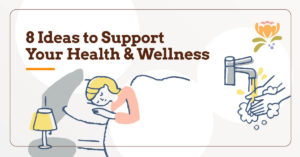Each year we anticipate spring. Winter often is challenging both physically and emotionally. We are ready to move from the cold weather and enjoy the vibrancy of spring colors and the warmth of the sun. Spring gives us a new opportunity to be active and engage with others. Ensuring that our seniors safely engage in all spring has to offer takes a little bit of planning.
ALLERGIES OR COLD?
During the winter, especially one where the flu is so aggressive, we rightly monitor every cough, sneeze and sniffle for evidence of a more serious illness. In spring, pollen creeps in and we STILL experience the coughs, sneezing and sniffling! How do you know if these symptoms are seasonal allergies or something more serious? This chart can help you determine the difference. If there are still questions or concerns, trained staff can do an evaluation.
| Characteristic | Cold | Allergy |
| How Long It Lasts | 3-14 days | Days to months — as long as you’re in contact with the allergy trigger and a short time after |
| When It Happens | Most often in the winter, but possible at any time |
Any time of the year, although the appearance of some allergy triggers is seasonal |
| When It Starts | Symptoms take a few days to appear after infection with the virus |
Symptoms can begin immediately aftercontact with allergy triggers |
| Symptom | Cold | Allergy |
| Cough | Often | Sometimes |
| Aches | Sometimes | Never |
| Fatigue | Sometimes | Sometimes |
| Fever | Rarely | Never |
| Itchy, watery eyes | Rarely | Often |
| Sore throat | Often | Sometimes |
| Runny or stuffy nose | Often | Often |
Once caregivers have determined the symptoms are due to allergies, how can we help seniors enjoy the outdoors and combat the effects of pollen?
- Monitor pollen levels. Sites like the Weather Channel’s Allergy Tracker or Pollen.com give daily updates on pollen levels by zip code. Should the pollen levels be high, avoid outdoor activity or limit exposure between 5am and 10am.
- Keep pollen off skin. If you usually air-dry clothing outside, consider using your clothes dryer during pollen season to minimize the amount of pollen you carry on your clothing. Washing your hands every time you come inside will also reduce the amount of pollen you are exposed to by keeping it away from your eyes and mouth. Shampooing hair regularly during pollen season is also helpful.
- Keep windows closed. This is the cruel irony of spring – we want to enjoy the fresh air, but it’s filled with pollen! Keeping the windows closed will help minimize the amount of pollen you regularly breathe in and keep it out of your living area.
- Consider anti–inflammatory or hypoallergenic food. Many foods are thought to reduce inflammation and combat histamines (the reaction to allergens). Examples of foods that may help with allergy relief are apples, sweet potatoes, blueberries, flax seed, green tea, pineapple, garlic, turmeric, mustard seed, sunflower seeds and even anchovies!
OUTDOOR SAFETY
Once the weather warms up, everyone has the urge to get outside! Again, some precautions should be taken to ensure that our seniors avoid falls, overexertion and weather-related issues.
- Wear sunscreen! No one likes a sunburn. After winter, our skin is more susceptible to burning after limited to exposure to the sun. Don’t let the pleasant temperatures fool you! A burn can happen in as little as 15 minutes. Sunscreen also helps protect against harmful ultraviolet rays, which may cause skin cancer.
- Use sunglasses. Sunglasses will not only protect your eyes from the sun, but also keep particles out.
- Dress appropriately. Layering is important during the spring season when temperatures can range widely during a day. Having a sweater handy for early mornings and evenings is a good idea. During the heat of the day, wearing lighter colors made of cool, breathable fabrics will help keep your body temperature more stable.
- Wear good shoes. Properly fitting shoes will make walking more comfortable. A slip proof sole will help prevent falls.
- Stay hydrated. Even if a senior is not sweating, water should be consumed consistently. Dehydration can lead to headaches, excessive hunger and lethargy.
- Light up! Be sure to have proper outdoor lighting in areas a loved one may frequent during early morning or evening hours. Dawn and dusk can cause shadows that alter our depth perception. Lighting will help fill in the shadows and allow for better visibility.
ENGAGE IN SPRING!
Winter can be very isolating. Travel is often difficult due to snow and ice. People are not outside as often due to the cold and heavy winds, as well as the shorter amount of daylight. Spring is the perfect opportunity to get back involved with other people.
Outdoor Exercise
Exercising is more enjoyable when we can be outdoors. For seniors, however, extra cautions should be in place if leaving home for physical activity. Always have a buddy system policy in place. Not only is exercising with a friend or loved one safer, it is also mentally engaging. If for some reason a senior will be outdoors alone, making sure they have a fully charged cell phone for emergencies is imperative. If you are concerned about the reliability of the phone for any reason, you can also invest in personal emergency alert equipment like a Belle device from Assisted Living Technologies.
There are many physical activities that are appropriate for seniors. A few are listed here, but be creative and come up with your own! And please share your ideas with others in our comment section!
- Nature walks. A park or sidewalk lined community are great places to meet friends for a walk. For a more strenuous workout, find a hiking trail and see what new growth you can discover. This is a fun activity to do with children – they love to explore, and you’ll be teaching them new things at the same time!
- Gentle yoga. There are many, many different types of yoga, so experiment and find your personal favorite. Hatha yoga is typically a good type of class for beginners. Restorative yoga usually incorporates tools to help you relax muscles more fully. Yoga is wonderful for helping with flexibility and balance, two physical needs to focus on as we age. Click here for a good explanation of the different types of yoga.
- Biking. Bicycling is a very enjoyable activity that gives the freedom to explore larger areas of a community. Make sure to have the correct size bike for you or your loved one to use. Take a test drive of the course before riding the route on a bike and make sure everyone is familiar with the area and comfortable with the route surface. Before beginning a bicycling routine, please ensure that your senior is still fully capable of handling a bicycle. Those with balance issues should use bikes with great caution.
- Lightweight training. Weight training is so good for muscles and bones. And the best part is that the weights do not have to be heavy to provide benefit! So, grab those 3-pound hand weights and head outside. A bench is a good place to do bicep curls and shoulder raises.
Gardening
Nothing says SPRING like freshly grown flowers and vegetables! Not only does gardening provide a tangible result, it offers the gardener a chance to get back to nature and engage in gentle exercise as well. A few tips will help a senior more fully enjoy the “fruits of their labors!”
- Choose early morning or evening hours. Working in the heat of the day can stress the plants and the senior.
- Think vertical. Bending over gets more difficult with age. Building a trellis for a senior allows for flowers and training vegetable to grow up, and not out.
- Watch for trip hazards! During the winter, limbs fall from trees or stumps become hidden beneath leaves that remain on the ground. Helping clean an area before gardening begins will make the area safer.
- Inspect railings and stairs. Ensuring there are solid rails on decks and stairs will help prevent slips and falls.
- Get and give help! Be prepared to help with tasks that may have once been easy for a loved one. Carry the potting soil, lift the tools down from the high shelf or hire someone to make needed repairs to outdoor living space.
Community Involvement
Helping organize a community event not only helps the community but it helps give individuals a sense of purpose and accomplishment. Many people want to help with a charity or event but don’t know where to start. Gather some friends and take the lead! Maybe there needs to be a park clean-up. Another idea is to organize a dessert drive for first responders. Big or small, helping others in the community brings a smile to the recipient and the planner.
Another great way to be around members of the community is by volunteering at a local festival. Volunteers are what makes these events run smoothly. Most newspapers or community magazines list upcoming events.This site also catalogs events that are submitted by users.
Spring is one of the greatest times of year! Ensure that everyone enjoys it safely.





